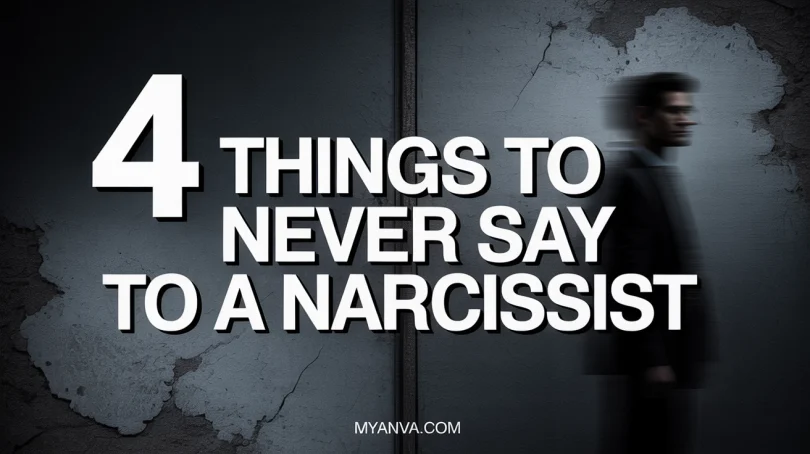The secret of remaining empowered in the presence of a narcissist is knowing what not to say. Your words can either strengthen or relinquish your power, and with a narcissist, this battle is even tougher. In this post, I share four things you should never tell a narcissist, as well as practical steps to ensure your peace and boundaries are preserved.
Why Words Matter with a Narcissist
When communicating with a narcissist, less is always more. The golden rule? Stop giving your power away. Narcissists thrive on control, chaos, and emotional leverage, so choosing your words carefully or opting for silence can be your greatest asset. Here are four phrases to avoid, along with why they backfire and what to do instead.
1. “You Always Do This”
Using absolutes like “always” or “never” is a trap. Narcissists will latch onto the technicality, derailing the conversation to argue about exceptions rather than addressing the real issue. For example, if you say, “You always ignore my feelings,” they’ll counter with a single instance where they didn’t, dismissing your point entirely.
Why It’s a Problem: Confronting patterns directly only works with emotionally safe people. Narcissists, regardless of where they fall on the spectrum, aren’t interested in accountability. They’ll twist your words to avoid responsibility, leaving you frustrated.
What to Do Instead: Recognize the pattern for yourself, but don’t engage in a debate. Step back and protect your energy. The win is in seeing the truth clearly, not convincing them to change.
Related Topics:
What is Future Faking & why do Narcissists do it?
Top 10 Ways to Break a Narcissist Without Saying a Word
2. “I Need You to Change”
Telling a narcissist you need them to change hands them the reins. It signals that your happiness or peace depends on their behavior, giving them leverage to manipulate you further. Spoiler: Narcissists rarely change in any meaningful way, so this plea is a waste of breath.
Why It’s a Problem: By outsourcing your healing to them, you reinforce their control. They thrive on power dynamics and will exploit your vulnerability.
What to Do Instead: Flip the script. Your growth begins when you stop relying on their actions for your well-being. Focus on your boundaries and self-worth, knowing that your peace doesn’t hinge on their behavior.
3. “Let’s Just Forget It and Move On”
This phrase might seem like a peacekeeping move, but it invites more pain. To a narcissist, it sounds like, “I’m willing to pretend this didn’t happen.” They’ll take it as permission to repeat the behavior without consequences.
Why It’s a Problem: True forgiveness doesn’t mean ignoring harm. Smoothing things over to avoid conflict sacrifices your self-respect and emboldens a toxic person to continue their behavior.
What to Do Instead: Stand in your truth. Self-love means holding the line, even if it’s uncomfortable. Don’t compromise your dignity for the sake of temporary peace.
4. “You’re a Narcissist”
Calling out a narcissist directly is tempting but futile. Labeling them triggers defensiveness, gaslighting, or even retaliation. It won’t lead to accountability, it’ll escalate the dysfunction and paint a target on your back.
Why It’s a Problem: Narcissists are emotionally and psychologically defended against self-awareness. No matter how clearly you spell it out, they’ll never see themselves as the issue.
What to Do Instead: Save your energy. Focus on protecting yourself rather than trying to expose them. Silence is often the most powerful response.
Navigating Interactions When No Contact Isn’t Possible
Going no-contact is the ideal way to reclaim your power, but it’s not always feasible right away. If you must interact with a narcissist, here are some strategies to stay empowered:
- Don’t Overshare: Never share sensitive or personal information. Narcissists collect “data” to use against you later. Respect your privacy and answer intrusive questions vaguely or not at all. Try responding with, “That’s an interesting question. Why do you ask?” If they persist, say, “I’d rather not say, thanks,” and leave it at that.
- Set Boundaries with Confidence: Practice saying “no” gracefully. For example, if they pry, respond with, “That’s a personal question. Why do you want to know?” Stay calm, breathe, and remain grounded in your body to make boundary-setting feel natural.
- Avoid Criticism: Narcissists are hypersensitive to perceived slights. Even constructive feedback can be twisted into an attack. Stick to neutral topics like the weather or small talk to avoid unnecessary drama.
- Stay in Your Integrity: Never compromise your values or agree to something you know is wrong just to keep the peace. Silence is better than selling your soul. Stand firm in your principles, even if it means saying nothing.
- Show No Fear: Narcissists feed on emotional reactions. Maintain a calm, detached demeanor, think “bored observer.” If you’re in physical danger, leave immediately and prioritize your safety.
- Don’t capitulate: Refuse to tolerate mockery, lies, or abuse. Setting clear boundaries sends the message that you won’t be a punching bag. If no-contact isn’t an option, get skilled at enforcing limits.
- Negotiate Strategically: In high-stakes situations like divorce or custody battles, don’t reveal what you want. Let them think the outcome is their idea, even if you’re quietly getting what you need. Keep your ego out of it and focus on the long game.
- Avoid Sharing Problems: Narcissists lack empathy and may exploit your struggles for their amusement. Turn to safe people or professionals for support instead. As the saying goes, don’t go to a hardware store looking for milk; they don’t have it.
Ready to Take Your Power Back?
Dealing with a narcissist can feel like navigating a minefield, but with the right strategies, you can protect your peace and reclaim your strength.






